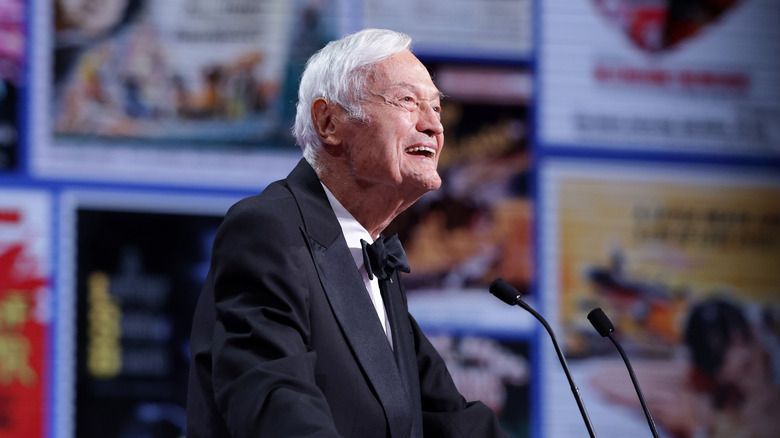Roger Corman, Legendary B-Movie Producer And Director, Has Died At 98
Roger Corman, the B-movie legend who helped launch the careers of Martin Scorsese, James Cameron, and Francis Ford Coppola, among many others, has passed away at the age of 98. His family told Variety that he died on Thursday, May 9, at his home in Santa Monica, surrounded by his loved ones. The family also released this statement:
"His films were revolutionary and iconoclastic, and captured the spirit of an age. When asked how he would like to be remembered, he said, 'I was a filmmaker, just that.'"
It's no exaggeration to say that Hollywood wouldn't be the same without Roger Corman. In a career that spanned half a century and hundreds of films, he directed and/or produced B-movie hits and cult classics like "House of Usher," "The Little Shop of Horrors," "Death Race 2000," and "Attack of the Crab Monsters" (not to mention a famously unreleased "Fantastic Four" movie). The hallmarks of his filmmaking were low budgets and short shoots, and his movies were particular hits at drive-in theaters. Whether he was referred to as "King of the Drive-Ins" or "King of Schlock" or "King of B-Movies," his nicknames all generally agreed that he was Hollywood royalty.
Corman began his career as a messenger for 20th Century Fox and worked his way up to becoming a script reader, but it wasn't long before he was writing scripts of his own. He found a clever way to skip the step of finding an agent to sell his first script. As Corman explained to the Hollywood Reporter, "I got a job with a literary agency, and then wrote a script and put a different name on it, and as a literary agent, I sold the script."
Roger Corman mentored some of Hollywood's greatest filmmakers
Not only was Corman a filmmaking legend in his own right, he also fostered some of Hollywood's greatest filmmakers. He first got to know a young James Cameron when he was building model spaceships for Corman and Jimmy T. Murakami's 1980 film "Battle Beyond the Stars." When the special effects team started falling behind, Corman sent his assistant down to find out what was going on. She told him that the head of special effects didn't have the background they needed, but there was a young man in the department called Jim who "really knows what he's doing."
"I went down and talked with him and saw what he was doing, and it was clear that the creativity was there," Corman told the Hollywood Reporter. "And he got a promotion. He is the only guy I think I ever gave a promotion and a raise to on his first picture."
The assistant, incidentally, was Gale Anne Hurd, who would go on to produce some of Cameron's early hits — "The Terminator," "The Abyss," and "The Terminator 2" — and eventually serve as executive producer of "The Walking Dead" and its spin-offs. Many other future filmmakers started their careers as Corman's assistant, or working under him as a second unit director. When Corman agreed to produce the movie "Boxcar Bertha" for American International, he brought a promising young filmmaker called Martin Scorsese onboard to direct it. "After the first couple of days of shooting, [the studio] wanted me to fire Marty and take over myself," Corman recalled. "I said, 'No, this guy is really good.'"
Corman continued working right up until the end of his life. Just a couple of months ago, the news broke that he was teaming up with fellow horror legend Joe Dante to produce a remake of "The Little Shop of Horrors." While he may not have been able to see that project through to completion, Corman leaves behind a legacy that shaped Hollywood. He will be greatly missed.

